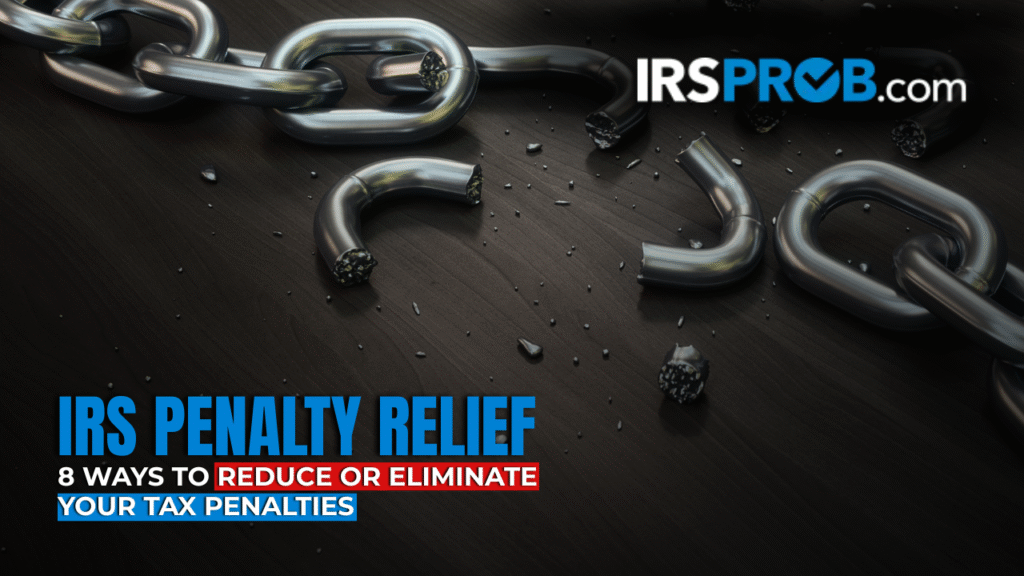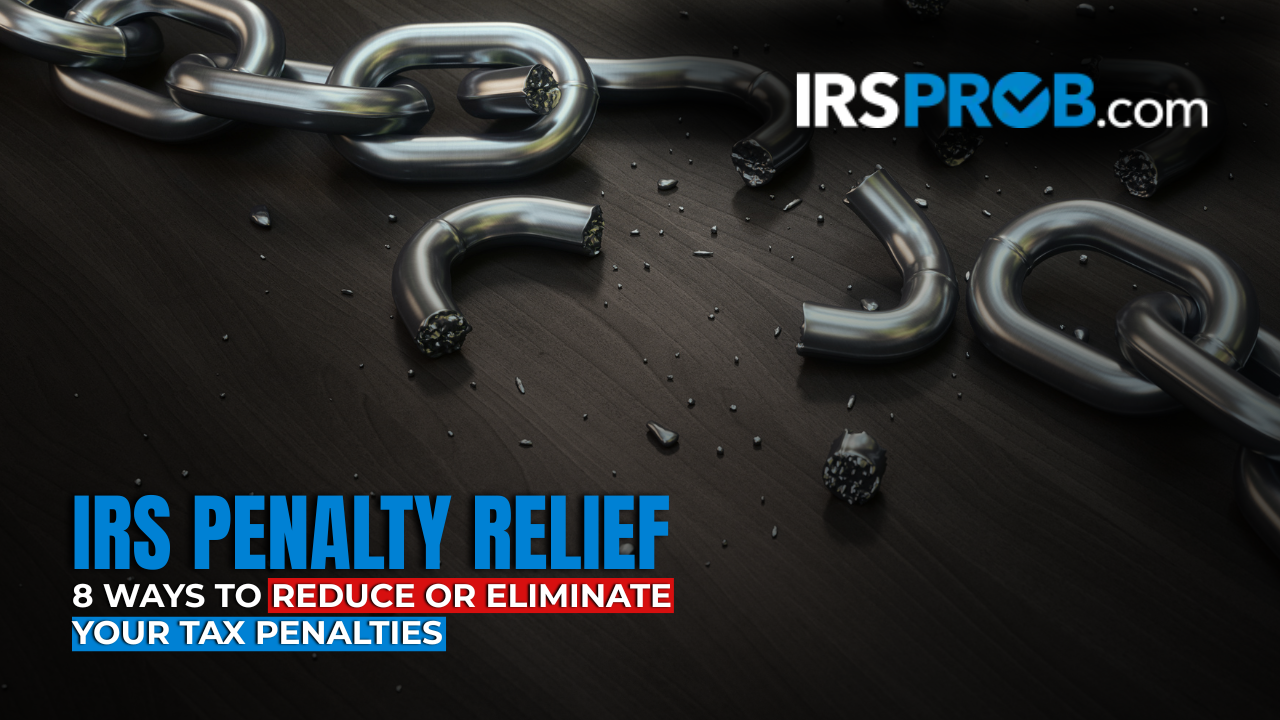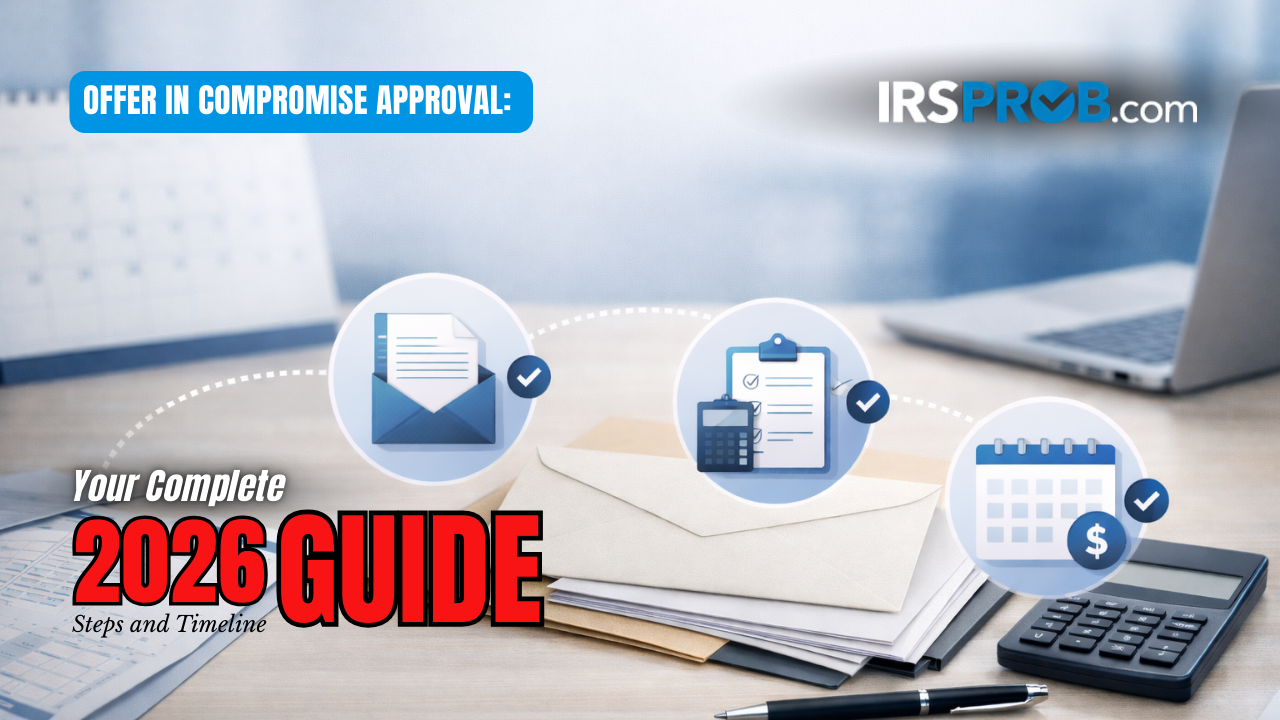
That sinking feeling when you open an IRS notice showing penalties stacked on top of your tax bill. Your stomach drops. The numbers seem impossible. You wonder if there is any way out.
This is something the IRS does not trumpet loudly: you could be eligible for IRS penalty relief even if you have taxes due. Thousands of taxpayers each year avoid or lower penalties by knowing what's available to them and taking the correct action.
This manual describes precisely how IRS penalty relief functions, which penalties are eligible, and the techniques you can apply to lower what you must pay. Whatever the reason for a missed due date, underpaid estimated taxes, or inadvertent error, relief is available.
What Is IRS Penalty Relief and Who Qualifies?
IRS penalty relief is a service that lowers or eliminates penalties charged on your tax account. The IRS understands that taxpayers occasionally miss obligations due to reasons outside their control, not willful neglect.
You may be eligible for IRS relief from penalties when you attempted to obey tax laws but were unable to due to reasonable conditions. This might comprise serious illness, natural disasters, bad advice from a tax professional, or having a history of clean compliance prior to when the penalty arose.
The trick is knowing what penalties are eligible and what kind of relief best suits your case.
Eight Common Tax Penalties Eligible for Relief
Not every IRS penalty qualifies for relief, but most common penalties do. Here are the eight penalties where IRS penalty relief most frequently applies:
When you do not submit your tax return by the deadline, the IRS charges 5% of unpaid taxes per month, up to 25% of your balance. This penalty hits hard and fast.
If you file on time but cannot pay your full tax bill, you face 0.5% monthly penalties on the unpaid amount. While smaller than failure to file penalties, these charges add up over time.
Businesses that fail to file required forms like 1099s or W-2s face per-form penalties that can reach thousands of dollars when multiple forms are missing.
The IRS assesses these when you substantially understate your income or claim improper deductions. The penalty typically equals 20% of the underpayment.
Businesses must deposit employment taxes on specific schedules. Missing these deadlines triggers penalties based on how late the deposit arrives.
Both individuals and corporations must pay estimated taxes quarterly. Falling short triggers underpayment penalties calculated on the difference.
When your payment bounces, the IRS charges penalties on top of the original amount due.
Various other penalties may qualify for IRS penalty relief depending on your specific circumstances and the type of violation.
Three Types of IRS Penalty Relief You Can Request
The IRS offers three main categories of penalty relief. Understanding which applies to your situation is crucial for success.
First Time Penalty Abatement: The Easiest Path
First time penalty abatement (FTA) is the most straightforward form of IRS penalty relief. If you have a clean compliance history, the IRS will often remove failure to file, failure to pay, and failure to deposit penalties for a single tax period.
You qualify for first time penalty abatement if:
- You filed all required returns or extensions
- You paid or arranged to pay any outstanding taxes
- You have not had penalties for the past three tax years
FTA does not require proving hardship or reasonable cause. Your clean record speaks for itself. Many taxpayers can request this IRS penalty relief option over the phone and receive approval immediately.
Reasonable Cause: When Circumstances Prevented Compliance
Reasonable cause relief applies when circumstances beyond your control prevented you from meeting tax obligations. The IRS evaluates whether a responsible person would have handled the situation differently.
Common reasonable cause situations include:
- Serious illness or death in the family
- Natural disasters that destroyed records
- Fire, casualty, or unavoidable absence
- Inability to obtain records despite reasonable efforts
- Reliance on incorrect professional advice
When requesting reasonable cause relief, documentation is critical. Medical records, insurance claims, letters from professionals, and detailed explanations strengthen your case for IRS penalty relief.
Statutory Exception: Specific Legal Provisions
Some penalties qualify for relief under specific legal provisions. These statutory exceptions are narrow but powerful when they apply.
The most common statutory exception involves incorrect written advice from the IRS itself. If an IRS representative gave you wrong information in writing and you relied on it, the resulting penalties should be removed.
How to Request IRS Penalty Relief: Step by Step
Getting penalty relief starts with understanding the notice you received. Read it carefully and verify all information is correct. Sometimes penalties result from IRS errors, and pointing this out resolves the issue immediately.
1Option 1: Request Relief by Phone
Many IRS penalty relief requests can be handled over the phone, especially first time penalty abatement cases. Call the toll-free number shown on your notice.
Have this information ready when you call:
- Your notice or letter
- The specific penalty you want removed
- Your explanation for why it should be removed
- Any supporting documentation
The IRS representative will tell you immediately if your penalty relief is approved. This is the fastest route when you have a strong case.
2Option 2: Submit a Written Request
If phone relief is not available or your case is complicated, write a request on Form 843, Claim for Refund and Request for Abatement. Include thorough explanations and supporting records.
For estimated tax penalties in particular, varying procedures hold based on whether you are a corporation or individual. Review the actual requirements for underpayment of estimated tax penalties prior to filing your request.
3Option 3: Work With a Tax Professional
Complicated cases, significant penalty levels, or past denials typically are best with professional assistance. Tax professionals know just how to present IRS penalty relief requests in language the IRS answers positively.
What Happens If Your IRS Penalty Relief Request Is Denied?
Denial is not the end. You have appeal rights that can reverse unfavorable decisions.
If you get a denial letter, read it thoroughly to determine why your request was denied by the IRS. Some typical reasons are inadequate documentation, failure to meet deadlines, or inability to prove reasonable cause.
You can file an appeal challenging the denial. The appeals process provides a fresh review by different IRS personnel who were not involved in the initial decision. Many cases succeed on appeal even after initial denial.
Time limits apply to appeals, so act quickly after receiving a denial notice.
Understanding Interest Relief on Penalties
Here is important information many taxpayers miss: the IRS charges interest on penalties, not just on the underlying tax debt.
This interest compounds the damage, increasing what you owe until you pay everything in full. The good news is that IRS penalty relief automatically includes interest relief on the removed penalties.
When the IRS approves your request and reduces or eliminates penalties, they also remove or reduce the interest charged on those penalties. This can save hundreds or thousands of dollars beyond the penalty amount itself.
You do not need to request interest relief separately. It happens automatically when your IRS penalty relief is approved.
Take Action on Your Tax Penalties Today
IRS penalties don't have to be a permanent weight on your shoulders. Each year, countless taxpayers discover that with the right knowledge and a proactive approach, they can secure IRS penalty relief and lighten their financial burden.
Review your IRS notices to identify which penalties you face. Determine if you qualify for first time penalty abatement based on your compliance history. Gather documentation supporting reasonable cause if applicable. Calculate potential savings including interest relief.
If your situation feels overwhelming or you have faced previous denials, professional help can make the difference between success and continued penalty accumulation.
The IRS will not automatically grant penalty relief. You must request it. But when you do so strategically with the right approach, the results can dramatically reduce your tax burden and give you a fresh start toward compliance.
Do not let penalties that qualify for relief continue draining your resources. Take the first step today.
Retirement Planning Guide | Professional Financial Advice Resource | Visit irsprob.com for Expert Assistance.







